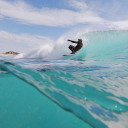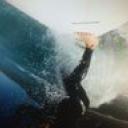Effects of climate change for surfers.


Great topic for discussion ID. Looking at it from a purely surfing perspective, I think surfers will simply adapt to the changing environment as and when it happens. However, I think any changes in the surf zone outside of the existing variables (ie tidal range) will happen slow enough that it'll be hard to discern through the course of a typical surfing lifetime.
That's not to downplay the effects of Climate Change at all - what I mean is that there are already a large number of factors that influence surf conditions on a day-to-day and year-to-year basis, so it'll take some time before the ramifications of Climate Change are felt in an obvious way in the surf zone.


There are a whole lot of other things which will influence surfing too, not just raised relative water levels at the shoreline and bigger storms.
Offshore structures that determine many of the best breaks will have less influence with higher water levels.
Coral reefs will only persist where their rate of growth can keep pace with the rate of sea level rise. This may mean that some reefs will actually be lost.
Others may be covered by algae as nutrients and temperatures increase.
Carbon dioxide dissolution will also make the ocean more acidic, meaning it is harder for the calcium carbonate skeleton to be laid down.
Increased temperature may lead to thermal stress and coral bleaching.
The temperature differential between the land and sea (hence morning offshores etc.) will change. Given the thermal capacity of the ocean and increasing albedo of coastal land this will probably be for the worse.
For much of the east coast of Oz, less frequent but more intense rainfall events would mean urban water quality issues.
Plus for many of the restricted beaches we currently surf, i.e. those with seawalls or cliffs preventing the beach from responding naturally, there may not be any sand in the system at all, hence no banks.


Warmer than colder? Imagine the summer crowds year round. One of the best ways to reduce the crowds is reduce the temperature. Bring on the next ice age!
I don't think global warming will be a good thing for surf spots in the long run but what about the short term (50 years)? With changes in ocean temperatures, I assume the ocean currents will also change, which will impact weather patterns. Can we expect to see any impacts in the quality of surf? Bigger storms generating bigger swells? More frequent? Etc.


There are people at CSIRO and ACECRC modelling this stuff. From what little I understand it is very tricky. The summary report I've read said about a half metre increase in the Sthern Ocean and up to a half m decrease in other parts of our coast.
They say this, taken from the latest IPCC report:
It is likely (medium confidence) that annual mean significant wave heights will increase in the Southern Ocean as a result of enhanced wind speeds. Southern Ocean generated swells are likely to affect heights, periods, and directions of waves in adjacent basins. It is very likely that wave heights and the duration of the wave season will increase in the Arctic Ocean as a result of reduced sea-ice extent.
In general, there is low confidence in region-specific projections due to the low confidence in tropical and extratropical storm projections, and to the challenge of downscaling future wind fields from coarse-resolution climate models.


No doubt there'll be some good and some bad. Although reefs won't be lost as far as surfers go if they die. The physical structures will still be there. And as indo says, a little depth isn't necessarily a bad thing for some reefs. Burgers will get worse tho!
The biggest concern I've got is irukanji and box jellies heading south. A few people got stung by irukanji in Hervey Bay last summer. I think that's a first. Not too much further to the sunny coast. I sure as hell won't be surfing while those bastards are in the water in the summer months. Not sure what the forecast is but they've got a long way south pretty quickly.
Be interesting to know how changed weather patterns will affect consistency of swell events too.


carpetman the East Australian Current has already shifted markedly to the south causing major ecological changes along Tasmania's east coast with many species that once appeared rarely now well established including a sea urchin which is a significant threat to biodiversity. Not sure how it will influence the surf but the water should be a little warmer!
http://www.abc.net.au/science/articles/2013/07/31/3811486.htm


benski, here is a link that might be good news...
http://theconversation.com/will-venomous-irukandji-jellyfish-reach-south...


Interesting stuff blindboy, thanks. Hopefully the corals don't spread south!


benski wrote:No doubt there'll be some good and some bad. Although reefs won't be lost as far as surfers go if they die. The physical structures will still be there.
It's my understanding that if the coral dies then the physical structure starts to break down, meaning it wont be there for long. Jock Serong wrote a very good article in Surfing World about a year ago on coral reefs and, from memory, death of coral reefs was explained that way. Once the corals die, further growth stops and the reefs begin to decay and erode, becoming deeper and affecting waves that break above them.


Indo-dreaming notes some great case studies in the Mentawais, with winners (Nias) and losers (Aceh) from less/more water over the reefs. My take is, with higher sea levels, we will see same.
However, for those of us on the east coast of Australia, i reckon there will be a net increase in surf spots - for one simple reason. Love it or hate it, on the majority of occasions that we have built structures in and around the wave breaking zone (think river training walls, beach groynes to trap long shore sand drift, sand by pass outlets and inlets) there has been an a net improvement in wave breaking quality (for example Ballina breakwall and Narooma breakwall). Fast forward to today, Palm Beach QLd - and there has been a 'promise' of sorts, that any future erosion control structure will improve surf quality. That trend will probably repeat elsewhere.
While there might be more spots, my question would be more about the swell direction. Will Sydney get more SE swells and more E and less ENE and Less norEast? How will that go for our beaches? (Which respond well to the existing broad range of swell directions). Will our Sydney beaches respond poorly (say more closeouts) with a more predominant swell direction kicking in? Winners and losers again?


andrew-pitt wrote:While there might be more spots, my question would be more about the swell direction. Will Sydney get more SE swells and more E and less ENE and Less norEast? How will that go for our beaches? (Which respond well to the existing broad range of swell directions). Will our Sydney beaches respond poorly (say more closeouts) with a more predominant swell direction kicking in? Winners and losers again?
A good question. But, I honestly can't see how Climate Change will influence the dominant swell direction on the East Coast to any major degree.


Over time the changes in the circumpolar winds could impact on the tracks of the lows in the southern ocean Ben. I would talso end to disagree with Andrew also on the impacts along the east coast. For me the major impact is likely to be erosion of those beaches which have suffered significant human impacts. Given the extent of the development along the coast and the history of sand mining in many otherwise undeveloped areas I would predict a big decrease in beach break quality on the scale of decades. I think this has already happened to some extent in Sydney. I would suggest that Norh Curl Curl and North Narrabeen have already seen significant detrimental changes, possibly from factors other than climate change, but still an indication of what can happen.


Well currently the shift in the Southern Oscillation from La Nina to El Nino sees the dominant swell direction on the East Coast swinging from east more to the south.
I don't know if more La Nina or El Nino events are forecast but if it is you could expect the dominant swell direction on the East Coast to swing that way.
And as blindboy pointed out, the circumpolar winds do have an affect on the swell direction in the southern states. When the Southern Annular Mode (SAM) is positive the westerly storm track retracts to the poles and produces swell with a greater southerly component compared to when it's negative and the westerlies are further north, generating more westerly swell events.
I think climate forecasts had the storm track pushing more south, so in theory swells would arrive more from the south than west. All very interesting!


blindboy wrote:Over time the changes in the circumpolar winds could impact on the tracks of the lows in the southern ocean Ben.
Yeah, I've read quite a few papers on this over the last few years (one of the most comprehensive ones was from Mark Hemer at CSIRO). However I'm not convinced that we'll see a noticeable change in swell patterns where (for example) our typical southerly swells reduce in frequency and are replaced with an increasing frequency of north-east swells. The swells we receive at the beach originate from an enormous range of weather systems - of which (as another example) a slight latitudinal shifts in the position of simple mid-latitude systems such as a Tasman low can result in either a SE or NE swell in Sydney.
I know I'm over-simplifying things here but I'm still a little skeptical that there are enough driving factors to warrant a significant change in swell direction across the East Coast (ie I can't imagine there being a time where people will say "well, before Climate Change kicked in we used to surf Boxy a lot more, because there were more south swells").
Again, I'm not trying to downplay the effects of Climate Change at all - just querying the basis of the claims re: swell directions. I love debating this stuff though.. so bring on more discussion!


I would agree with that over the short to medium term Ben, that is the next few decades. Over that time scale the short term variability is likely to mask any trends. Beyond that I would think there is a high probability that we will see changes as tropical storms and cyclones change their tracks and the shifts in the circumpolar winds become more pronounced.


@stunet.
hmmm, well that's a depressing reality. So any benefits (increase in breaks that only break on high tides) may only be short term anyway.


Most of the reefs in my region like lower tides so I think the effect here will be detrimental. I don't think it will impact significantly in my lifetime but the tidal windows for optimal surf could get smaller and certain breaks could be unsurfable during the winter months with the big tides. That would be a bummer!
I'm a firm believer in doing more to switch towards renewable energy but sea level rises may not be reversable. We will have to adapt and we will, that's human nature, survive or perish, for better or for worse.
I just can't see how pumping billions of tonnes of carbon into the atmosphere using old technology is acceptable when we are capable of switching both the source of our energy and the products we consume that energy with to be much more efficient? The corporations have no incentive to switch as they have a monopoly and our long term survival as a species appears way down the list of their priorities.
Likewise some people, like animals will happily live in a pile of their own shit, but others prefer to clean up after themselves if they can?
Besides we may need that coal, oil, and gas for other uses in the future so why waste it all now in such an inefficient manner as we do currently?
The corprotocracy has proven time and time again they will band together to protect their interests over that of the people. It was amazing how the lead up to last weekends Climate Action Day was barely reported, but thanks to social media 60,000 people turned up and the media were forced to report on it then?


stunet wrote:It's my understanding that if the coral dies then the physical structure starts to break down, meaning it wont be there for long. Jock Serong wrote a very good article in Surfing World about a year ago on coral reefs and, from memory, death of coral reefs was explained that way. Once the corals die, further growth stops and the reefs begin to decay and erode, becoming deeper and affecting waves that break above them.
Stu, my understanding is that coral starts its growth on rock (or similar structure) meaning that if the corals die and break down, it will erode back to rock reef again. The issue will be at what depth (thickness) the coral is.
On most reef breaks the coral is of a different, hardier type than that in lagoons and lee sides of reefs/islands, to be able to take the punishment dished out by constant swell hitting it, meaning extremely slow growth.
If the coral was to die, would seaweeds, barnicles etc then start to grow over it like on rocky reefs?


Your right yorkes..but there are the few when a bit more water is needed for them to break consistently..I'd love to surf them more :)..Does rising ocean levels mean not as lower tides. or would there be a greater discrepancy between highs and lows? would higher water levels mean swell penetrates further ? If so I know of another 20 reefs that have the potential to have high quality waves!!


Yeah ID, have seen it heaps over there. There are also alot of soft corals also.
Where I notice it most is here on the GBR and I found Fiji exactly the same. You can see bare rock/reef in all the veins in the reef where the coral hasn't formed very thick due to (my persumption) pounding from the swell.


hi all
don't understand the ocean that well only to just surf the waves but all your posts are a great read. climate change is happening my work is in sports turf and 13 years ago we couldn't grow a variety of turf that loves the east coast of NSW and QLD. But we now grow it without any problems on the Mornington Peninsula Vic this is partly due to the increase in the temperature ??? its happening. been selfish hopefully the waves will improve


Lots of factors Indo but for me the loss of dunes has been critical. Year by year, storm by storm the banks fail to fully recover and the profile of the beach tends to get steeper.


:)
As society generally we're not adept at recording environmental change.
The rapidly advancing anthropocene age is a planet doing what it always is doing, striving for equilibrium. Many 'pest' species, native and exotic, fulfill roles delivering unsustainable ecological services in an attempt to keep up with humans ability to rapidly adapt. Adaptation is the human species key to success.
Coral atrophy, sand drift and biodiversity loss leading to extinction are factors of a changing ecosphere. Definitely am more concerned with or ability to adapt our way into riskier ecological position. When there is not enough resource for sustainable living; famine, conflict and death rise. As always, the continuance of the species will be an evolution of generations... dependent on our thinking prowess.
There is hope. But not really. Actual reality is that our ability to make global level shifts in ways of unsustainable living is flailing. Can technology and communication save us? Not if people accept our society as it stands. Nothing can be done whilst apathy rules the working class and control the rest.


I stumbled across Murdoch's chief financial guru/climate skeptic Terry M'Crann's latest offering in The Herald Sun today. Basically saying that the climate scientists and summits/meetings are just a way of feathering the climate industries pockets for personal gain. The fossil fuel industry could never be accused of such hypocrisy of course? Here's a link.
http://m.heraldsun.com.au/business/climate-hysterias-budget-pain/story-f...



Some degree of solution can be done through personal choice: for example, this reply was written using solar power and at night time, hydro power. It's all out there and usable through choice. Worth investigating and however little, it's making a difference.
BB: tend to agree about the sandbank quality/sand flows being altered for the worse through intervention - I cite sand starvation and reduced banks at Secret Harbour after development, and sand starvation up at Bluff Pt after the Geraldton marina, and the contrast of what was known as 'Sandtracks' before the 1950's (?) Freo Harbour extension to what is there today, as examples.


Sometime due to change in the climate the surfers can't easily do surfing, as the change in the climate also cause the rise up in the waves and this led to the change in the concentration of the riders. so if you want to surf during climate change then it depends upon your risk.
lastly want to say that do surf with precautions and stay safe.


So we are looking like failing on keeping global warming to 1.5 degrees more like at least 2 degrees on current trajectory. The UN IPCC reckons the effect of 2 degrees is loss of 99% of the worlds coral reefs rather than 60 - 70% at 1.5 degrees. Any insights on effect of coral deaths on surf breaks that currently break on coral. Not to mention all those hungry Indos that would have lost access to fish from coral reefs that provide the protein needs and effect on all the non human species that rely on coral reefs.


The death of 99 percent of the world’s corals if the world got 2 degrees warmer ....complete and utter bullshit.
Sorry, someone had to say it.


Where did you get the notion that fish grow faster in warmer water Indo?
My understanding is that colder water is richer in nutrients (hence why cold seas never seem clear and blue) which in turn supports more organisms and those that feed on them and upwards through the food chain. Of course I could be completely wrong as I don't have a link at hand to support my argument.


Fair enough. I guess I was basing my call on most of the worlds commercial fisheries are in cold water rather than recreational species that the average fisho would chase.


Water temperature and fish.
Already, right now, warm water fish are being found in Victorian and Tasmanian waters. More alarmingly destructive star fish that were previously found only in warm water are now infesting Tasmanian coastal waters.


Indo d “BTW. warmer water generally is richer with life than colder water and fish generally grow faster etc in warmer water, so those areas in now more colder waters could actually see an increase in fish rate growths and ranges of fish species.”
Not true. Cold water is more nutrient rich than warm water


Blowin and Indo – do either of you have qualifications in marine science/ecology? I mean formal quals…not “my qualifications are 500 years of experience fishing and surfing so F-off ya f&#$(%(&# millennial cry baby snowflake what the F would you know”-type of qualifications.
Faster growing fish and diversity of species are not the same thing. You (Indo) just confused the two. So what if fish grow faster in the tropics? What non-sense in terms of species diversity. Some of the most biodiverse marine areas on the planet are cold-water. Every spoken to deep sea commercial fisherman? The most sought after species occur where cold water sits normally or wells to the surface. Think the Galapogas and ‘sea mounts’. Some of these high-biodiversity areas are in our own territorial waters.
Look no further than where marine conservation areas are located. Notice anything? Decent mix of warm and cool water areas. Whaddya reckon that's due to the level of marine diversity there?

What are the chances that the IPCC’s forecast regarding coral reefs are based on the conclusions of those with relevant qualifications. I’m talking people who hold PhDs and have spent years of their lives, with F-all salary, studying coral reefs (present day and geological evidence), fish, other marine organisms, coastal engineering, and the broader cryo-, hydro- and biospheres. I reckon there’s a good chance they didn’t just find that statement on some internet blog run by a guy called Kev who thinks koalas are a pest and Mack Trucks* should have their own dedicated lanes and gluten-free is for nambypambies…or perhaps they found it in an article who works for a media company that’s owned by a family that likes to holiday in a superyacht off Monaco with a person who owns coal mining assets….I really do wonder who is more qualified.
The impacts to coral reefs aren’t just from increased temperatures. But you would know this if you knew anything about which you speak (I’m talking climate change here, not reefs as a notion). Ocean acidification and marine heatwaves will compound the impacts of increased average temperatures. Tot to mention the effect existing impacts caused by marine pollution already have in undermining the ability of reefs to bounce back. All of these things together are why the qualified scientists have stated that “in a +2 degree world” coral reefs as we know them in the present day (where they exist today) are gonna be screwed.
Have small scale bleaching events occurred in the past? Duh. You don’t need to be a marine ecologist to know that. But they were small in scale and short-lived and few and far between. The problem is the scale, intensity and frequency of what we’re already seeing and what is very likely to occur in future. In the past, reefs bounced back because the areas not affected could “re-populate” those that were. What happens when half is affect this year, and then another 50% of whatever recovers and is left 5 years later….see what I’m saying?
Unless you’re qualified, perhaps swim/surf/blusterandspittlenonsense in your own lane. If you need a stent put in an artery, you’re not gonna go to Kev the Mack Truck Mechanic to get it done**…yet somehow when it comes to climate change and the impacts it will/will not have, somehow everyone’s opinions regardless of qualifications and experience are meant to be equally regarded? In internet speak…STFU and GTFO…
Man that turned into a rant. Kudos to anyone who read it all.
*an impressive piece of engineering, I won’t lie
** unless he used to be a surgeon and has a working operating room he can use.


Nice mowgli nice


No one is qualified in predicting a long term future based off modelling, irrespective of what they’d have you believe. In case you were still deluded enough to imagine that there is A SINGLE PERSON on this planet who is qualified to predict the future with certainty ....there is not anyone capable of this. So yes , you may as well ask the Mack truck driver his opinion because it is literally as legitimate as a computer model.
And the IPCC hadn’t introduced the caveats of introduced pollutants or maintaining the same corals in the same areas. If you think that nature - who created corals in the first place - is dictated to by the limitations of scientific reactionism or previous notions of possibility, then you obviously haven’t had much to do with nature.
If the IPCC said that 99 percent of the world’s corals will die with 2 degrees ocean warming then they are wrong. Full stop . Dreaming. And the Oscar for drama in an environmental production goes to.......


Thanks Blowin that is honestly the best laugh I have had in a long time.


^^ Not even going to get drawn into this. So misinformed on so many levels Blowin..
"you may as well ask the Mack truck driver his opinion because it is literally as legitimate as a computer model."
Face palm!


No worries , Laurie.
You’ve been flawless in your satirical portrayal of the mindless old bugger believing every minuscule of fake left propaganda for a few years now . God knows we’ve all had a laugh at your efforts.
Glad you can get a sneaky giggle in here or there.....even if it’s because you’re stuck in character.
Don’t forget to take the makeup off at the end of the day , mate. I’d hate for people to think you’re as gullible as the character you’ve chosen to act out.


So Craig .....you think that the world will be denuded of coral with a 2 degree global warming ?
Have you ever seen coral ?


The long term predictive analysis of computer modelling defined....


the issue to me is not about predictions/modelling and their accuracy or validity, but about humanity's ability to change their practices to become sustainable stewards with the planet - a living thing as well. humans are the most self aware beings/things on the planet and that entails realising that our planet/environments- all inclusive- is what gives us our existence.
all of life has consciousness in many levels and when a self aware being- a human- intentionally uses it's energy to harmonise with another part of life, like planet earth , it creates an amplification of the essential source energy that runs everything. now this essential source energy knows how to fix up all the fuck ups that humans have created in their ignorant misuse of planet earth.
thats why it is so essential for humanity to come together with the one intention of working with planet earth to treat and use the earth resources with respect. as said, this intention and energy will amplify the essential source energy and solutions will come forward.
so to bicker over which way it happens or try to control how it happens only subtracts from the combined energetic intention of sustainable stewardship.
u lot can do what you want, but i am choosing to have humanity and the planet live together healthily and happily, that is my one and only focus- you are welcome to join me.


I’m not bickering about the direction humanity has to take in regards to it’s treatment of the environment, I’m calling utter bullshit on the claim that basically ALL coral in the world will cease to exist with a 2 degree rise in global temperatures.
It rivals the most outlandish and unsubstantiated loads of tripe I’ve ever heard. Ridiculous claims such as this do no justice to the reality of our abhorrent treatment of the planet. It reduces the credibility of the genuine scientific arguments.


Blowin, from what I've read/heard it's not just the temperature increase that'll cause problems. As Mowgli points out, there's second-order effects too (warmer water means more CO2 can dissolve in the water; meaning a higher concentration of carbonic acid, which corals apparently don't like. Kinda analogous to planting a fruit tree in soil too acidic for its tastes?). Seems that warmer average temperatures also come with wider temperature swings & larger & more frequent storms, both of which would you'd think would cause stress and damage to corals?


“In case you were still deluded enough to imagine that there is A SINGLE PERSON on this planet who is qualified to predict the future with certainty ....”
Only, that’s not what they (climate scientists) are doing. They express the forecasts (model results) in terms of likelihood. Never do they say it is certain. The closest you’ll see is “almost certain” or “virtually certain”. Because even a rudimentary understanding of probability and physics illustrates that if you hold a standard $3 ceramic coffee cup from Woolworths filled with hot coffee over the floor of the study beside you, and you let go of the cup, one cannot say with absolute certainty that a number of “almost certain” outcomes will occur – including whether it will even reach the floor, whether the cup will shatter, or the coffee will be spilt. Let alone when discussing the climate system..
You would definitely know this if you’ve actually read any qualified climate science (or science for that matter) material.
But maybe you have. So I guess #trollsgottatroll. It’s just a shame because there are people who will not see your dribble for what it is and end up forming incorrect opinions based on it, and then go on to propagate those same untruths in their own networks. Hence why we’re still full coal-powered-steam head towards the climate disruption cliff edge…


Seems the talk of the month around here is climate change.
Now putting aside all the political stuff and we all know there is many negatives and im not suggesting we should be pro climate change or start lighting indo style plastic fires in our backyards, so don't go blasting me for even bringing this up, but as surfers if we be a little selfish for a moment as us surfers are good at being and just look at the effects climate change could have on surfing?
We know all the negative things, but everything in life has a good side and a bad side.
It got me thinking (and a google search) could climate change have a positive effect for surfing?
Heres a good article http://www.abc.net.au/environment/articles/2012/11/19/3634514.htm
For example most reefs (not all) are better on higher tides while most sand bottom points/rivermouth are better on lower tides so any sea level rise could see improvements in many reefs (yes i know not all) while sand bottom breaks in theory would adapt to sea level changes as there supplied by moving sand (from rivers, from beaches and erosion of dunes)
In regard to coral reefs, Sumatra could be a good example of how land height changes effect wave quality, for example much of sumatran offshore islands have been sinking especially the mentawais (sinking is virtually the same as sea levels rising) I guess we don't know what the mentawais were like before land sunk but it definitely is good now, personally i think sinking coral reefs have more chance of creating good waves than ones that rise or even don't change.
In sumatra (south end of Mentawais and from Nias to Aceh) we can also see the opposite effect where reefs even islands have had sudden uplift often a metre plus, and i can only think of three examples where wave quality has increased from this (Roxys in sth ments, Lagundri at Nias and a reef in Simeulue)
While in every other case wave quality has been negatively effected (some examples quite a few reefs in Simeulue have said to have changed for the negative even now not surfable, Treasure island in banyaks not as long or good, Asu and Bawa in Hinakos lost best sections, Afulu, the machine at Nias, and a few waves in the sth Mentawais like rags left)
So chances are coral reef wise in Indo at least wave quality could improve more than be negatively affected.
Offcourse then you have the affect on weather systems winds and swell.
I guess the effect of whether its a positive or negative in regards to surfing will have a lot to do with where you live the set ups and swell and water temps.
I just hope they come up with a better sun protection otherwise we will be screwed no matter what.